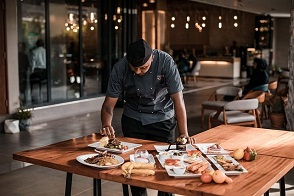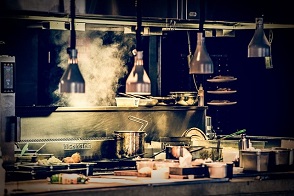Exploring Restaurant Jobs in Germany: What You Need to Know
Germany, with its diverse culinary landscape and bustling restaurant scene, beckons international jobseekers with the promise of exciting experiences and professional growth. But before packing your bags and whipping up your signature dish, it's crucial to delve deeper than the romanticized postcards and understand the hidden gems and challenges within the German restaurant industry. This in-depth article, specifically tailored for international jobseekers, dissects the realities of restaurant work in Germany, highlighting essential information and lesser-known aspects that can shape your job search and career journey.
Embracing Craft Beyond Basic Service: While German service values attentiveness and efficiency, remember that you're entering a culture that deeply respects culinary craftsmanship. This extends far beyond flipping burgers and pouring beer. Aspiring chefs can specialize in regional specialties like hearty Bavarian fare or refine their skills in Michelin-starred kitchens mastering intricate French classics. International cuisine is also burgeoning, offering opportunities for niche expertise in Thai curries or Japanese ramen. Remember, apprenticeships, known as "Ausbildung," offer a structured path to mastering your craft. These typically three-year programs combine hands-on training in professional kitchens with classroom learning, providing a valuable foundation for your culinary journey.

Unlocking Potential: Mastering Language and Dialects: While English fluency opens doors in tourist hotspots, mastering German unlocks countless opportunities throughout the country. But don't just stop at basic phrases – understanding regional dialects, menu terminology, and food culture nuances is key. This not only fosters deeper connections with colleagues and guests but also allows you to navigate contracts, workplace communication, and customer interactions effectively. Imagine confidently discussing wine pairings with a Bavarian connoisseur in their local dialect – an invaluable skill that sets you apart.
You may be also interested in:
Respecting Hierarchy & Teamwork: Navigating the Kitchen Structure: German kitchens maintain a clear hierarchy, with restaurant chefs, sous chefs, and senior kitchen staff commanding respect due to their experience and leadership. Entering this environment requires cultural sensitivity and understanding. Respect their guidance, actively learn from their expertise, and demonstrate your willingness to contribute within the established structure. However, remember that teamwork is crucial. Communication and collaboration are essential for smooth operations, especially during peak hours. Learn to efficiently communicate within the team, anticipate needs, and offer support wherever possible. While initiative and leadership opportunities might come later, establishing yourself as a reliable and collaborative team player is key to building trust and paving the way for future growth.
Contracts & Working Hours: Knowing Your Rights and Options: Germany prides itself on renowned work-life balance regulations. Standard workweeks are 40 hours, with overtime typically compensated according to agreed-upon rates. Contracts often stipulate vacation days, sick leave, and social security benefits, providing a secure work environment. Take the time to understand your entitlements and don't hesitate to clarify any uncertainties with your employer. Remember, open communication and clear expectations are essential for a positive work experience.
Tipping Culture: Appreciate Gestures, Don't Rely on Them: Unlike other countries, tipping in Germany is more casual and discretionary. While good service might be rewarded with a small gratuity, don't expect hefty tips to supplement your income. Factor in the base salary when assessing the overall compensation package. Remember, professionalism and genuine hospitality are valued more than expecting large tips.
Specialization Pays Off: Hone Your Niche Skills: Upskilling in specific areas can significantly enhance your career prospects and earning potential. Whether it's pastry-making, becoming a certified sommelier, or mastering vegan/vegetarian cuisine, these specialized skills are in high demand. Consider attending vocational courses or workshops to refine your expertise. Imagine impressing guests with your handcrafted sourdough bread or expertly pairing regional wines with their meals – skills that make you stand out in the competitive job market.
Hidden Gems: Beyond Major Cities: While Berlin, Munich, Frankfurt, and Hamburg offer abundant opportunities, consider exploring vibrant and affordable cities like Freiburg, Leipzig, or Dresden. These cities boast thriving restaurant scenes, lower living costs, and a chance to immerse yourself in distinct regional food cultures. Imagine preparing Swabian specialties in Freiburg, mastering Saxon pastries in Dresden, or learning the secrets of Thuringian dumplings in Leipzig – a unique opportunity to expand your culinary repertoire and cultural understanding.
Networking & Building Your Community: Unlocking Hidden Opportunities: The German restaurant industry thrives on connections. Attend industry events, join online communities like "GastroPlattform" or "Chefkoch," and network with chefs and restaurateurs. This opens doors to hidden job opportunities, fosters mentorship, and provides valuable industry insights. Imagine attending a food festival, connecting with a renowned chef, and landing your dream job at their Michelin-starred restaurant – the power of networking can unlock unexpected possibilities.

Adapting to Work Culture: Embracing Differences for Growth: Remember, cultural adjustments are inevitable. Be open to diverse communication styles, direct feedback, and a more structured work environment compared to your home country. Embrace these differences as learning opportunities and demonstrate your cultural adaptability. Germans tend to value direct and constructive communication, so don't shy away from asking questions or clarifying expectations. The structured work environment might require punctuality and adhering to established procedures, but this also ensures smooth operations and professionalism. Remember, flexibility and a willingness to learn are key assets in any new work environment.
Patience is Rewarded: Long-Term Growth and Stability: While career progression might appear slower initially compared to some countries, loyalty and commitment are highly valued in German workplaces. Mastering your craft, demonstrating reliability, and building strong relationships with colleagues and employers can lead to steady promotions and long-term career stability. Remember, the German restaurant industry often fosters a sense of community and shared passion for food, making it a rewarding environment for those seeking a long-term career path. Imagine starting as a commis chef, gradually gaining experience and trust, and eventually being entrusted with your own kitchen station or even opening your own restaurant – a testament to the possibilities offered by dedication and perseverance.
Additional Tips & Resources:
- Understand Visa & Permit Requirements: Research visa and work permit requirements carefully, especially if coming from outside the EU. Consider seeking professional guidance to ensure a smooth immigration process.
- Explore Diverse Restaurant Types: From traditional Gasthäuser to modern bistros and international fusion restaurants, Germany offers a diverse range of dining experiences. Consider your interests and career goals when choosing your job search focus.
- Learn About German Food Culture: Familiarize yourself with German food culture, regional specialties, and popular dishes. This knowledge will impress potential employers and enhance your overall experience in the industry.
- Consider Language Courses: Investing in German language courses can significantly improve your job prospects and overall integration into the German lifestyle.
Remember: Entering the German restaurant scene requires thorough research, cultural sensitivity, and a willingness to adapt. By embracing the challenges, honing your skills, and navigating the hidden gems, you'll find a rewarding and enriching career journey within Germany's dynamic and diverse culinary landscape. Bon appétit!
Additional Resources:
- Federal Employment Agency (Bundesagentur für Arbeit): https://www.arbeitsagentur.de/en
- German Hotel and Restaurant Association (Deutscher Hotel- und Gaststättenverband): https://www.dehoga-bundesverband.de/
- Make it in Germany: https://www.make-it-in-germany.com/en/
Disclaimer: This article provides general information and should not be considered legal or professional advice. Always consult with relevant authorities and qualified professionals for specific guidance.
